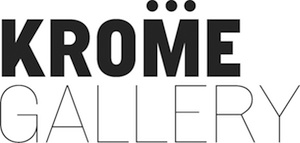•
ANDRIS EGLĪTIS
NEAR IDEAL
23.06. - 04.08.2012
Opening: 22.06.2012, 6-9 pm
•
click the picture to launch gallery
•
A forest within grasping distance of electric street lights, a meadow surrounded by a chain-link wire fence, heaps of construction debris next to a dense growth of shrubs are pictured in a vaguely recognisable, semi-abstract manner. Incorporeal because of the hazy appearance, they avoid being a straightforward depiction of social distortion. Rather, these are humble dwelling-places of the local spirits, who are affected by a mutant gene. The latest series of landscape paintings by Andris Eglītis, on show at KROME Gallery, is a reverence for the forlorn genius loci of urban outskirts.
When framing the gaze, Eglītis prefers to leave the eyesores of visual pollution outside the picture. Although there probably is an overhead high-voltage transmission line running across the field, or a maintenance shed besides the portrayed group of trees, they stay beyond the frame. Or they become the frame. As in the case of a half dismantled railway track, the wooden sleepers of which the artist has used to build an immense easel on the spot of the outdoor painting session. The presence of train has a significant role in the modern tradition of pastoral genre. Henry David Thoreau contemplated on the disturbing sound of a train in the distance while sitting on the doorsteps of his Walden hut. “The train has come, thanks God! What time it is?” are the famous opening lines of Anton Chechov’s “Cherry Orchard”, a play about the social collapse of the old Russian nobility’s Arcadia. Railroad, once a symbol for changes brought by industrial progress, nowadays seems like yet another leftover of the century long utilization of nature.
Instead of working with the traditional types of pigments, the artist restricts himself to the variety available in situ and concocts his paints by using soil samples obtained at the sites of plein air sessions. Sceneries of secluded corners rendered with a limited palette and generous brushwork emphasise the air of hopeless neglect and boredom. It is the painterly texture and the absorbing materiality of the surface that holds the viewer captive. The reciprocity between the tactile materiality of the picture plane and the spatial illusion it creates evokes reflections on the very concept of landscape and its status as a cultural construct of human imagination. It also reminds the viewer of the efforts once made by academia to obtain the secrets of the “ideal landscape”.
Next to the landscape paintings of secluded corners of nature, Andis Eglītis’ show also includes works depicting room corners of unaccomplished interiors. The concept of "ideal landscape" as the alternative to the fierce realities of everyday life are too outmoded to appease the modern service society, which prefers to stay indoors anyway. It is the comforting perfection of plasterboard interiors that nowadays serves as a plain projection ground for the ideal ego. Smooth surfaces and lightweight constructions cover up the deformities of nature caused by the consume orientated high-tech lifestyle. On the urban-rural fringe, the interface between town and country, these deformations become visible again.
•
„Andris Eglītis uses surprisingly few mediating elements in his work. His guest for immediacy and the strong sense of intensity go hand in hand with what he calls the “moment of revelation in everyday circumstances”. Spiritual and even religious undertones are invoked in his self-presentations, which also reveals a need to shape and interpret the non-verbal and the subconscious.”
- Maria Lind

